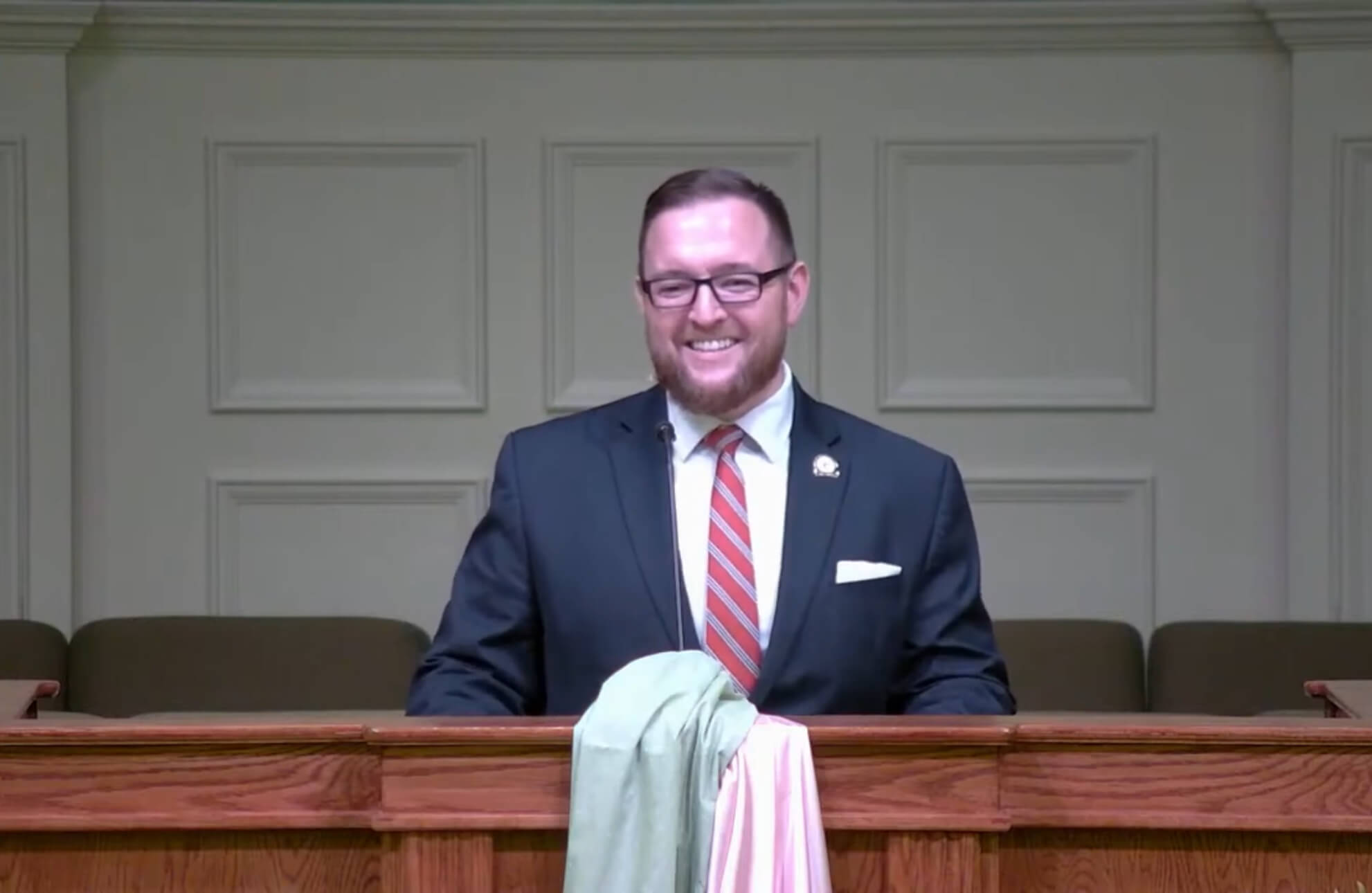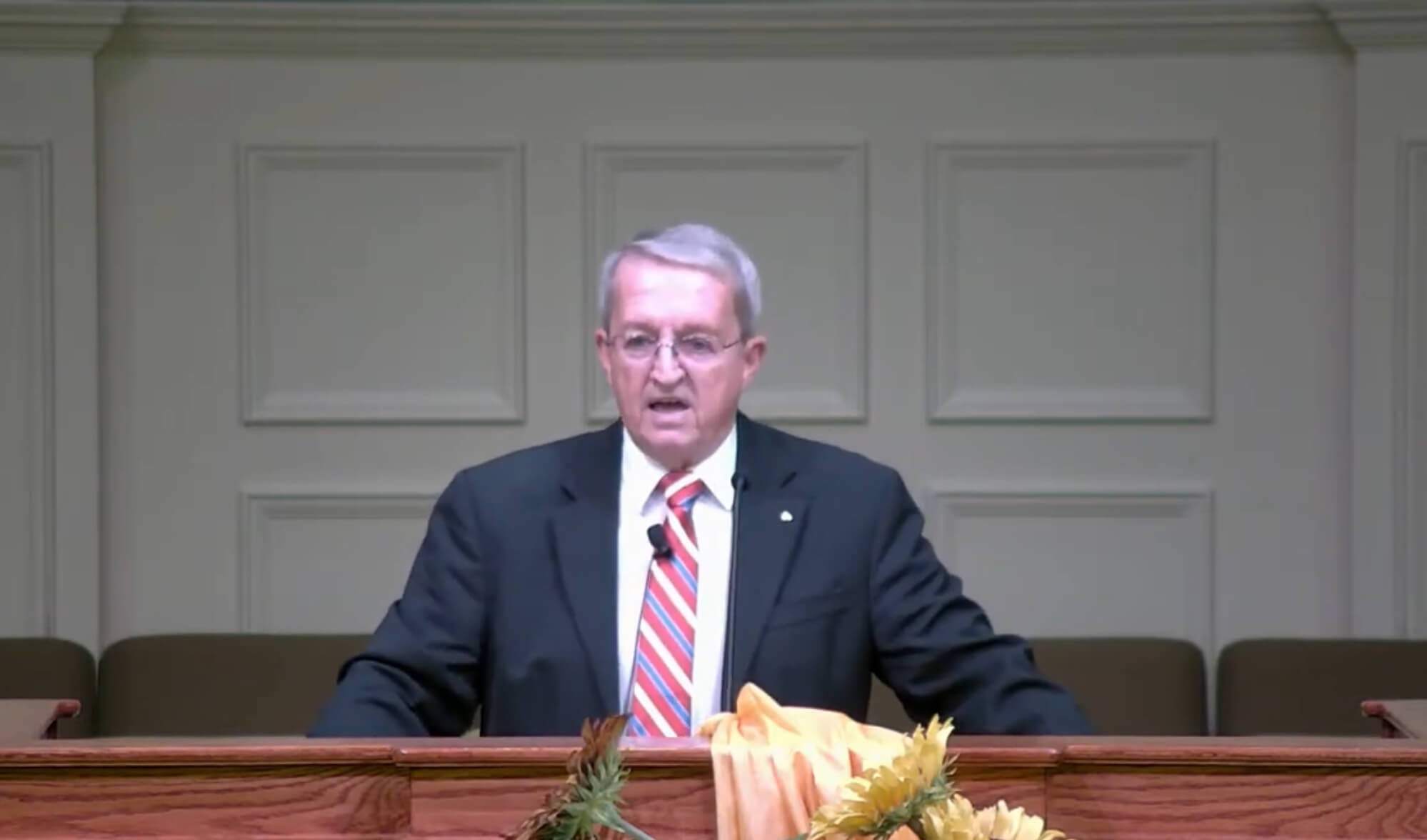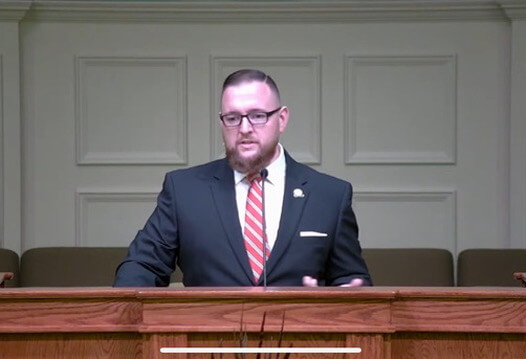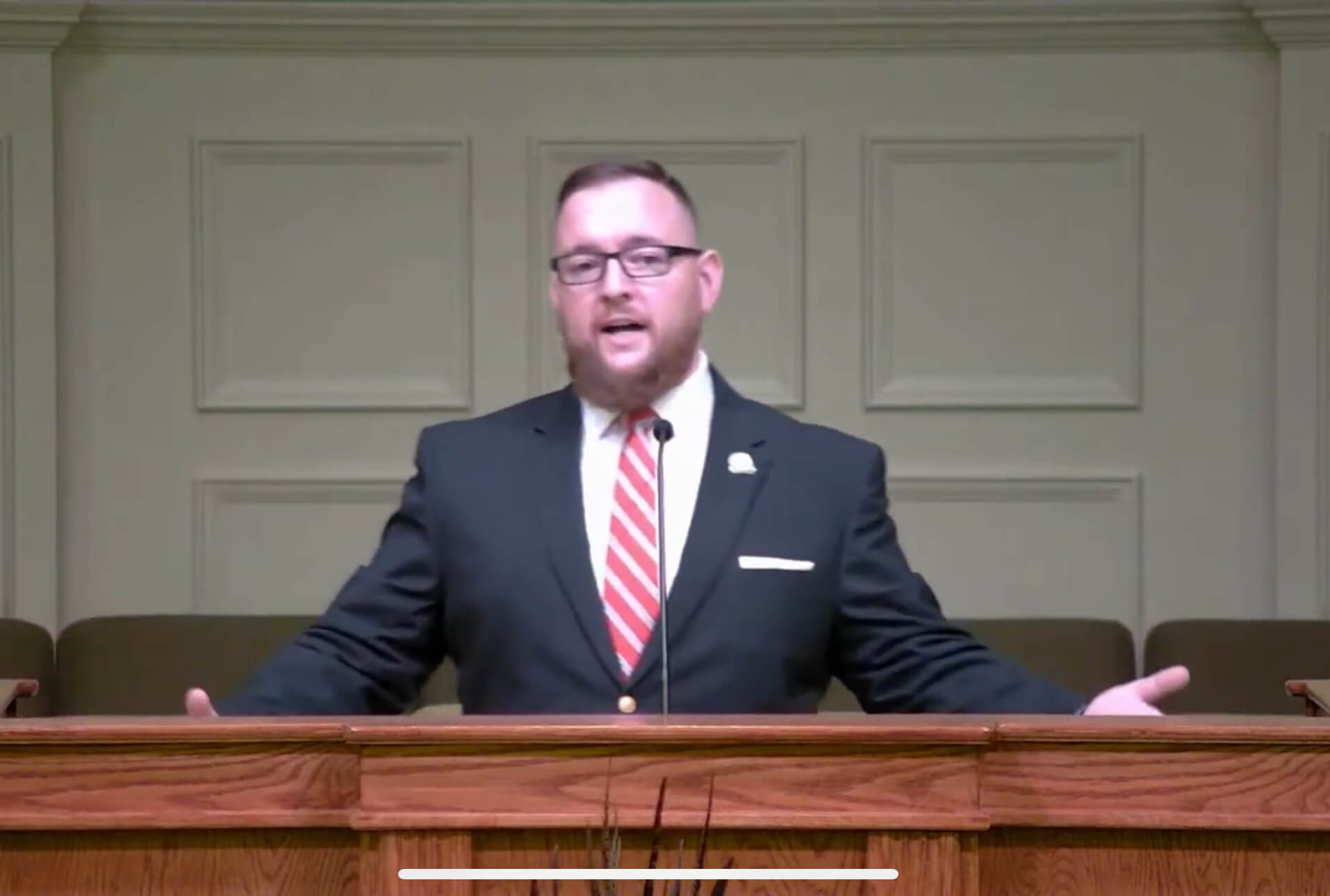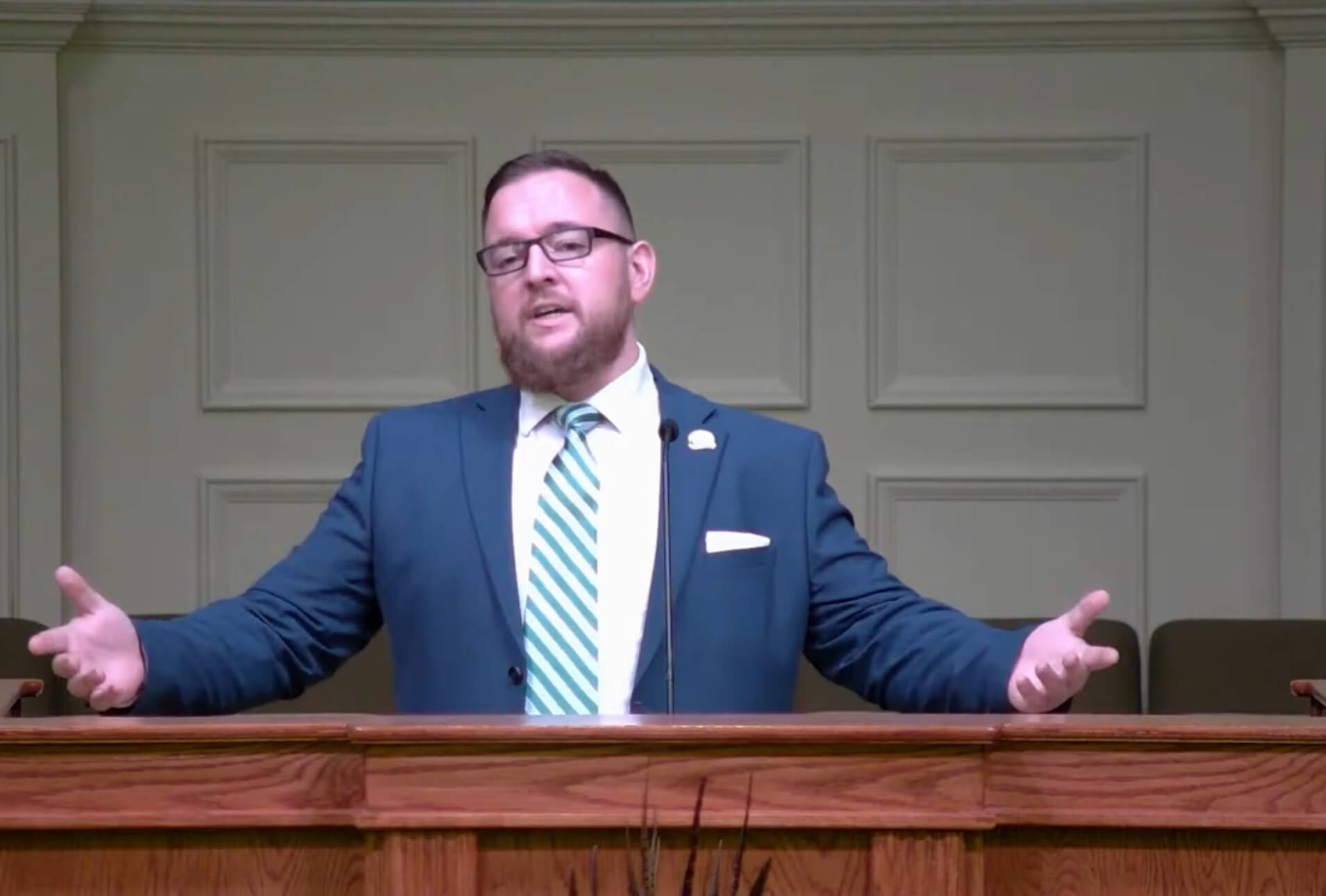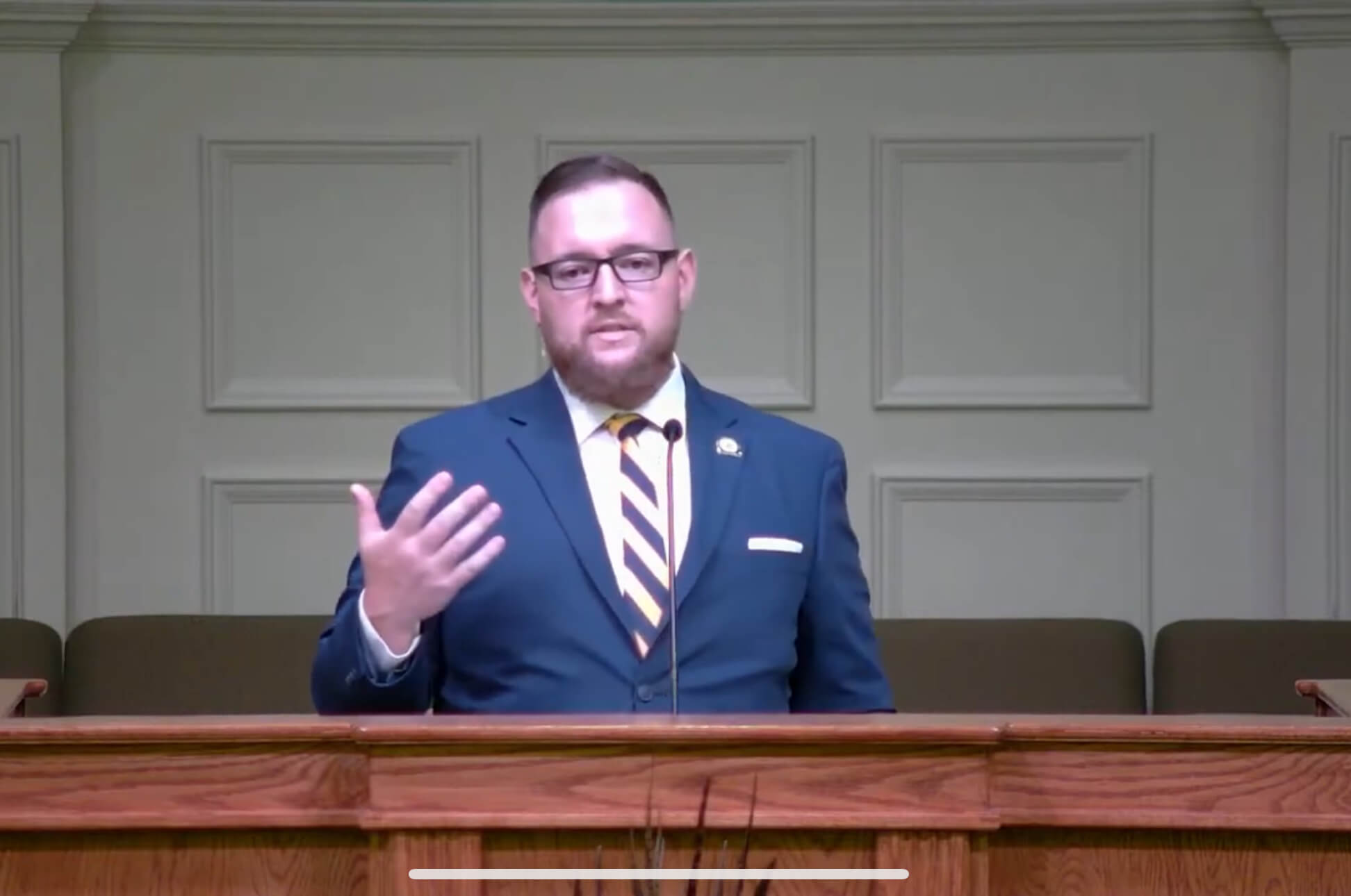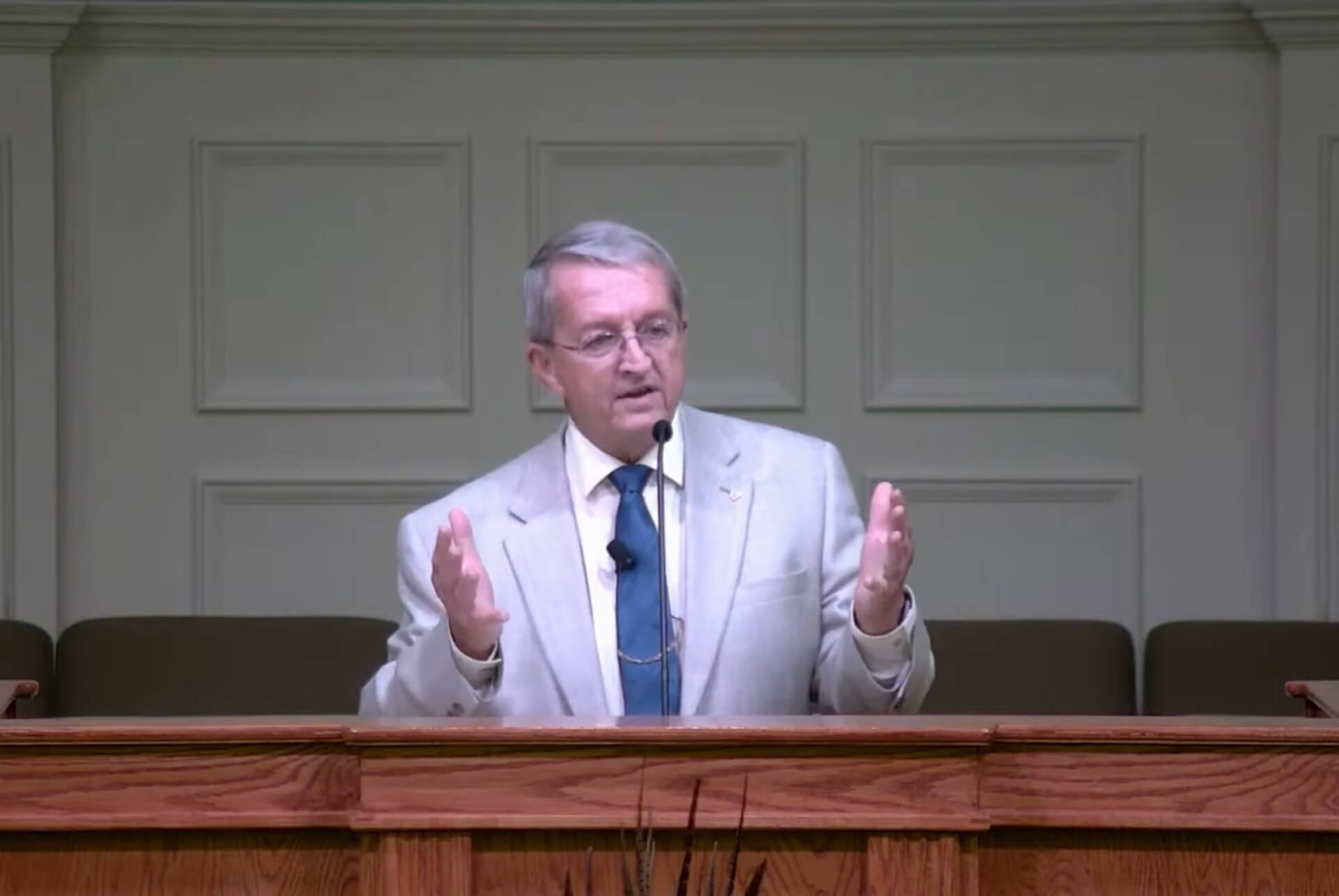Video
“Confidence Before God”
1 John 3:21-24
Pastor Ryan J. McKeen
05/19/24
Audio
Transcript
Amen, wonderful singing tonight. Those are some old songs, but some great ones. Turn with me once again in your Bibles to the book of 1 John. Back in 1 John chapter 3, and tonight we will finish chapter 3 of this book.
If you remember, as I introduced the book of 1 John, I spoke of the different cycles that John goes through, that he really comes back and repeats the same topics over and over again in a little bit different way, but then each time he adds a little bit more to it. He adds a little bit more to the teaching. a technique, an ancient Greek technique of teaching and writing. And that’s how they would teach their pupils, that they would teach the same thing over again and just add a little bit more and a little bit more.
And we’ll see that tonight as we have some repeated themes, again, as he closes out chapter three. But then also he adds another element to our assurance. And that’s what we’ve been covering here in this whole letter, is our assurance of salvation. And that’s, again, why he continually repeats, by this we know. And we’ll see that tonight. And this is one of the markers to know when he’s adding something new. He adds the phrase, by this we know. And we’ll see that as we get into our text tonight. But again, we know, as we’ve seen over and over again, that the reason why he wrote this letter, we see right at the end of the book, is so that you may know that you have eternal life. So we got to remember that’s where all of this is pointing to, that we may know that we have eternal life.
This morning, he really was specific in the topic of assurance as he spoke of how our heart can assure us and it can also condemn us. And when it condemns us, God is greater than our hearts. So we saw that we must not ignore our conscience. We must be convinced of God’s love in us that outflows in our life. And then we must be convinced of God’s greatness outside of us. And so that’s where we will pick up this evening. We covered verses 19 and 20, and we’ll cover verse 21 here this evening. God is greater than our hearts, and he knows all things. And that is an encouragement to us. That’s why we sing songs like, How Great Thou Art. that should be an everlasting comfort for us, how great God is. His greatness is immeasurable. His greatness is beyond finding out. And if God knows all things, He knows when we sin. He knew beforehand when we sin. and he’s declared believers to be righteous.
We saw that back in chapter two with the idea of propitiation, that if anyone does sin, we have an advocate with the Father, Jesus Christ, the righteous. And that’s why Paul wrote, there is therefore now no condemnation for those who are in Christ. And that’s where our assurance is ultimately found, in God, in his faithfulness, in his His omnipotence and in Christ and his sufficiency as a mediator. And so tonight as we come to verses 21 through 24, we really see four evidences of our salvation.
So he spoke of the idea of assurance in our hearts and how we can confront our heart when it is condemning us. But then he closes this chapter really with kind of a repetition of the evidences he’s already given of how we can know that we are saved. And right at the end in verse 24, he adds another. And we’ll see boldness in prayer, which we already saw in chapter one, verse nine, that we need to confess our sins, and he is faithful and just to forgive us our sins. We need to go to God with our sins, and we’ll see that again tonight. We see obedience to his commands, that’s number two. And again, chapter two covered a lot of the obedience to Christ, that if you love me, you’ll keep my commandments. And that if you are of the light, You will obey Him. You will keep His commandments.
So John’s already covered that as well. Thirdly, we’ll see belief in Christ is another mark of our salvation. And that one seems obvious, but we’ll see again how this is not only a command to unbelievers, but it’s a command to believers as well. Keep on believing. Grow in your belief. Grow in your faith. And then lastly, the fourth thing that we’ll see, the fourth evidence, the one that John adds this time around, is awareness of the Holy Spirit, awareness of the work of the Holy Spirit in your life. And so those are the four evidences we’ll see. And I mentioned the circular pattern of this book. And in fact, John MacArthur said this was the hardest book he preached. because of the repetitious nature of it. And he found it difficult to come with a new sermon every time when he’s preaching the same topics.
But, as he points out, there are differences every time John comes back around, and that’s where we need to focus on, is the things John adds to or says in a different way. And that’s what we’ll do this evening. Again, we need to examine ourselves to see if we’re in the faith and know for certain that we are saved. So let’s read our text this evening. I’m going to read 1 John 3, verses 21 through 24. This is the word of the Lord. Beloved, if our heart does not condemn us, we have confidence before God. And whatever we ask, we receive from him, because we keep his commandments and do the things that are pleasing in his sight. And this is his commandment, that we believe in the name of his son, Jesus Christ, and love one another, just as he gave a commandment to us. And the one who keeps his commandments abides in him, and he in him. We know by this that he abides in us, by the spirit whom he gave us.
So again, you see a lot of the repetition that John has already spoke of these things. And we saw in the end of verse 19, or 20 I should say, that in whatever our heart condemns us, God is greater than our heart and knows all things. So on the one hand, if your heart is condemning you, if your heart is accusing you and bringing up, your own conscience is bringing up these sins that you know that you commit, God is greater than our heart, and we talked about that this morning. God’s grace is greater than our sin. God is a forgiving God. God is rich in mercy. He delights in showing mercy, and we need to come to him with our sin. So that’s on the one hand, if your heart is condemning you. But on the other hand, in verse 21, he gives the other side of the coin, that beloved, if your heart does not condemn you. If it does not condemn us, remember we talked about this morning, our conscience can either accuse us or it can defend us.
Sometimes when we do the right things, when we obey Christ, our conscience defends us. Our conscience reassures us of who we are, of reminding us of being God’s children. And that’s why obedience is an important part of our assurance, as we’ll see in a minute. So we see both sides here. If your conscience condemns you, trust in God. But if your conscience does not condemn you, we have confidence before God. That’s why our conscience defends us. We have assurance that we are truly saved, and if we do, we will have boldness in our prayers. That’s our first evidence we see is boldness before God, confidence before God. When we are walking in faithfulness and obedience and when we trust in Christ and His blood, we will have confidence. Our doubts will end when we put our fears and our worries and our doubts on Him. True assurance of our salvation causes us to enter God’s presence with certainty. with boldness, that we can come to our Father. We don’t need to be afraid.
The New Testament is full of references to this confidence that we can have before God. In Ephesians 3, verses 11 and 12, it says, This was in accordance with the eternal purpose which He carried out in Christ Jesus our Lord, in whom we have boldness and confident access through faith in Him. Because of Christ, because of what Christ has done, propitiating our sins, taking the wrath of God for us, we can enter the presence of God confidently, knowing that He has no wrath destined for us because it was poured out on His Son. That’s the confidence we have. Hebrews chapter 10, we read a piece of Hebrews 10 this morning, but Hebrews 10, 19 says, therefore, brothers, since we have confidence to enter the holy places by the blood of Jesus.
Second Corinthians chapter three, verses four and five, in such confidence we have through Christ toward God, not that we are sufficient in ourselves to consider anything as coming from ourselves, but our sufficiency is in God. Our sufficiency is in our God. Really, coming before God with boldness and confidence is trusting in God. Believing what He said. Believing that we are truly forgiven. Believing that Christ’s sacrifice is enough. We have nothing to fear. We can come to our Father. And as the next verse says, and whatever we ask, we receive from Him. Whatever we ask, we can come confidently to our Father, and we know that He will give us what we desire. The word confidence here means boldness or freedom of speech even. And it typically describes coming before someone of importance or power and speaking freely, not being afraid to say what’s on your mind. Here it’s believers coming into the presence of our Heavenly Father without fear. And we have full assurance as it says, that whatever we ask, we receive from him.
Now, of course, this is according to God’s will, because as the verse continues, because we keep his commandments and do the things that are pleasing in his sight, we know that we will receive the things we ask because we are living in the will of God. We are following God. We are pursuing what he wants for us. This is like in Romans 8, all things work together for good for those that love God. Well, what’s your definition of good? Well, my definition of good needs to be God’s definition of good. Whatever is good for me, not whatever I enjoy in that moment, not whatever I want, whatever God deems good. All things work together for that good, for those who love God and who are called according to his purpose.
And now some might think it’s presumptuous to think that, well, I can come to God confidently. I can come to God boldly. We are supposed to fear God. We are supposed to tremble before our great God, and that’s true. God is great. He is majestic. Whenever God reveals himself physically to people in the Bible, they fall down as if they’re dead. And yet, we have the work of Christ, that Christ has bought us that access. that we stand before God with a mediator, defending us, arguing our case. Boldness in prayer is a clear evidence of a changed heart. You think of some of the great faithful Christians that you know, and usually, they are marked by a great prayer life. Usually, when you hear them pray publicly, it’s evident. They have boldness before God. They go to God regularly. Prayer is not a new thing. And that’s what it’s talking about.
Because we are saved, because we are believers, we should be going to God frequently. We have confidence that we can bring anything to Him. We don’t need to be afraid. And again, Hebrews speaks a lot of this, but Hebrews 4.16, This is because we know God as Abba, Father. He is our Father. That’s what Romans 8.15 tells us. We realize that when we ask anything, we should be desiring to ask according to his will, and when we do, he is going to hear that, because he’s promised to meet all of our needs.
So the first evidence of salvation is boldness in prayer, and this was really just evidence of a relationship. You are a little less bold with somebody you just meet, but when you have a friend, a longtime friend, you can speak confidently with them. You have regular conversation. You speak back and forth as though you’ve been friends for a long time. The same is true as we grow in Christ. As we have a longer and deeper relationship with God, we grow in our boldness and confidence to come to God with anything that we need. So number one is boldness in prayer.
The second evidence here in verse 22 is obedience. Obedience to his commands. We’ve seen this again already. Obedience to the commands of Christ. So verse 22, and whatever we ask we receive from him because we keep his commandments and do the things that are pleasing in his sight. Notice it does not say whatever we ask we receive from him if we keep his commandments. as if we’re earning some sort of favor with God, that if I obey you, then you’ll give me what I want. If I scratch your back, you’ll scratch mine. That’s not how this works.
The obedience to his commands and the doing things pleasing in his sight is assumed. Because those things are true, which they are if you’re a believer, then we will receive what we ask. So because those things are already true, we’re not earning something by our obedience. This is the change in affections that we spoke of this morning, that we have this new desire for obedience, for righteousness, to do the things that are pleasing to God. Why do we do them? Because it pleases God.
I don’t need any more reason than that. This pleases my God, my Father. We obey God simply to please Him. That’s what it is to be a slave. We’re not earning our wages. We’re slaves to God. He is our master. We obey to please Him. We do whatever He pleases. He is our Lord. We willingly desire to serve Him. And this is true heartfelt obedience. Obedience out of love. We obey because we love God, not because we owe God or We are afraid of God if we don’t obey.
This is directly opposed to the false external legalism of the Pharisees. The Pharisees obeyed too, but they didn’t obey out of love for God. They obeyed out of selfish ambition and pride and making themselves look better than those around them who didn’t obey as well as they obeyed. This is not that type of obedience. This is obedience because we want to please him. And we want to please him because we love him.
Jesus spoke of this in John 15 in the upper room with his disciples. Really, the letter of 1 John is just an explanation of the gospel of John. John is taking the doctrine found in the gospel of John and putting it into practice for these believers’ lives. And in John 15, verse 7 through 11, Jesus says, if you abide in me, and my words abide in you, ask whatever you wish, and it will be done for you. Sound familiar? Same thing he just said in 1 John. Verse eight, my Father is glorified by this, that you bear much fruit, and so prove to be my disciples. Just as the Father has loved me, I have also loved you. Abide in my love. If you keep my commandments, you will abide in my love. just as I have kept my Father’s commandments and abide in His love. These things I have spoken to you so that my joy may be in you and your joy may be full.” This John 15, 7 to 11 is a condensed version of the book of 1 John. Jesus’ own words, abide in me and my words abide in you, and whatever you ask, it will be done for you. My Father is glorified that you bear much fruit and so prove to be my disciples.
How do we know we’re a Christian? That’s the question of the whole book. How do we know we’re a Christian? We prove to be his disciples when we bear much fruit, when we do these things, when we show that we are a Christian. And just as the Father loved me, loved Christ, I have also loved you in the same way that the Father loves the Son eternally. Christ loves us. So, his encouragement here, his command in this whole section, abide in my love. Abide in it. Think about it. Dwell on it. Study on it. Read on it. Abide in my love. Then he says, if you keep my commandments, you will abide in my love. Well, how do I abide in your love? Keep my commandments. If you love me, you will keep my commandments. If you keep my commandments, you will abide in me, just as I’ve kept my Father’s commandments. Jesus says, this is not impossible. I’ve given you an example. Keep my commandments and you will abide in my love. And the result is that these things I have spoken to you so that my joy may be in you and your joy may be full. This is the joy of being in Christ, abiding in His love by keeping His commandments. Throughout the New Testament, we are reminded of these things.
Doing the things that are pleasing in His sight should motivate everything we do. We should want to please God in all things, in every decision we make, every thought that we have. Now, that’s a hard one, isn’t it? Every thought we have, does that please God? I don’t want to think about that too much, especially when I’m driving in traffic around here, man. But everything we do, we should do to please God.
Hebrews 13, the end of the book of Hebrews ends with this. Now, the God of peace who brought you up from the dead, the great shepherd of the sheep, through the blood of the eternal covenant, our Lord Jesus. equip you in every good thing to do His will by doing in us what is pleasing in His sight, through Jesus Christ, to whom be the glory forever and ever. Amen. To do what is pleasing in His sight. That’s what the Holy Spirit equips us to do. Because we are truly saved, we aim to keep His commands. We have those desires, those affections, to do what is pleasing to Him.
So the second evidence here is obeying His commands. Thirdly, we have belief in Christ. Again, this might seem obvious. Of course, part of the assurance of our salvation is, do we believe in Christ? But our belief is something that we need to make sure of. Verse 23 says, and this is His commandment, that we believe in the name of His Son, Jesus Christ, and love one another. just as he gave a commandment to us.
So we can draw our assurance from the reality that we still believe in Christ. Simple as that. When someone comes to me and says, I just don’t know if I’m a Christian. Well, do you believe that Jesus died on the cross and that God raised him the third day and that he paid for your sin? Well, yeah, but no. Do you believe? Yeah, you believe. It’s as simple as that. Believe on the Lord Jesus Christ and you will be saved. Belief. This faith is in response to the commandment. Faith is a commandment. We are commanded to believe. Repent of your sin and believe on the Lord Jesus Christ. All people are given that command. But you might be thinking, well, is belief really obedience? That sounds like works, not faith. Well, it’s both. It is obedience, because we’re commanded to, but it is faith. That’s Ephesians 2, 8 through 10. For by grace you have been saved through faith. It’s through faith. You’ve been saved through faith. And not of yourselves, it is the gift of God, not of works, so that no one may boast. But verse 10, for we are his workmanship, created in Christ Jesus for good works, which God prepared beforehand so that we would walk in them. There’s a whole process there. It’s not just faith and that’s it. It’s faith so that we can do what God created us for, so that we can do good works.
See, faith and works are not opposed to each other. They go hand in hand. Faith and works are evidence that we have been made new, that we have been redeemed. They are the result of our salvation. God has done the work of regeneration in our hearts, and we’ve been made new creations. And now we can respond in faith and good works. John has reiterated throughout this epistle three really essential elements of the Christian life. Faith, love, and obedience. Faith, love, and obedience. All three are present in the Christian. This is our assurance. Do we have faith? Do we have love? And are we obedient?
And he says here, we need to believe in the name of his son, Jesus Christ. That sounds like an interesting way to put it. Do we just believe in the name or do we believe in the work of Christ and all that Christ did? Well, it’s one and the same, but what he’s emphasizing here is what Jesus’ name means, all that it entails. The name of Christ. He is the Christ. His name shows all that he is. He is Savior and he is Lord. You can’t have one or the other. He is Savior and Lord. And sometimes it’s said that, well, you need to make Jesus Lord of your life. No, Jesus is Lord of your life. You need to submit and recognize that He is the Lord. Believing in the name of Christ is also an important theme in the New Testament. You see it throughout. At the end of the Gospel of John, John 20, 31, these things have been written so you may believe that Jesus Christ, Jesus is the Christ, the Son of God, and that by believing you have life in his name. You have life in his name.
And then earlier in 1 John 2, 12, we already saw this passage, but I am writing to you little children because your sins have been forgiven for his name’s sake. And then later we’ll come to in chapter four, verses 14 and 15, we have beheld and bear witness that the Father has sent the Son to be the Savior of the world. And whoever confesses that Jesus is the Son of God, God abides in him, and he in God. It’s belief. It’s confessing the name of Christ. And again, don’t think that this is only a command to unbelievers. It is certainly a command to unbelievers, that we need to believe in the name. But it’s also a reminder to believers, to those who already do believe. We need to keep on believing. Keep the faith. Believe in His name. Believe in what His name means. What His name accomplishes for you.
One commenter put it very well, R.S. Candlish, he says it like this, keep on believing, continue to believe more and more simply because you see and feel it more and more to be his commandment that you should believe on the name of his son Jesus Christ. Unbelief in you who have already believed is aggravated disobedience. What he means there is if you are truly a Christian and yet you act like you don’t really believe or you act like you are doubting, That is aggravated disobedience. Not only are you disobeying, but you should know better. He continues, and as such, it must be especially displeasing to God. It is his pleasure that his son should be known, trusted, worshipped, loved, honored, as he himself would be honored. Do not deceive yourselves by imaging that there may be something rather gracious in your doubts and your fears. Your unsettled and unassured frame of mind as if it is betoken humility and a low self or low esteem of yourself. Beware lest God see in it only a low esteem of his son, Jesus Christ.
Don’t think there’s something honorable in doubting Christ, in doubting your savior. The Apostle Paul repeats over and over, he boasts in the Lord. He boasts in Christ. We need to be confident in Christ. Confidence is not arrogance. Confidence is certainty. I believe in who Christ is. I believe in what Christ did. I believe in what Christ does even now. That’s confidence. in the name, belief in the name of our savior. And then, just for good measure, John, the apostle of love, adds in, and to love one another. The commandment is to believe in his name and love one another. Don’t forget that. They are both realities for Christians. Believe in the name of Christ and love one another.
So the third evidence of salvation is belief, belief in Christ. Which brings us to our fourth and final evidence in this text this evening, and this is the new element that I was speaking of earlier, the thing John adds to his teaching this time around, and that is an awareness of the Holy Spirit. He really hasn’t talked much of the work of the Spirit or being aware of the Spirit in our life, but that’s what he says here in verse 24 as he comes to the end of his summarization of our confidence and our assurance.
He says in verse 24, and the one who keeps his commandments abides in him and he in him. We know by this that he abides in us by the spirit whom he gave us. So you see there really just a repetition of the words of Christ that we just read in John 15, the one who keeps his commandments abides in him. And then he says, and he in him, that’s and Christ in the one who keeps the commandments, so it’s vice versa. And we know by this, or that’s just another way of saying by this we know. Many versions have it that way. By this we know that he abides in us. How? By the Spirit, whom he promised to give us, whom he promised to send to us By that Spirit, we know that He abides in us. This blessing was promised by Christ. It’s promised to the one who keeps His commandments and abides in Him. And this life, this shared life with Christ is only possible through the Spirit. Through the Spirit of Christ, through the Holy Spirit.
The work of the Holy Spirit, what the Holy Spirit is doing in this very moment is a mystery to us. Jesus tells Nicodemus that, as Nicodemus came to Christ, and Christ is explaining the way salvation works in John chapter three in verse 80. He says, the wind blows where it wishes, and you hear the sound, but you do not know where it comes from or where it’s going. So is everyone who has been born of the Spirit. You don’t know how the Spirit’s working, but you can see it. You can see the effect. Same thing with the wind. You don’t see the wind, you see the effect of the wind. Well, in the same way, we ought to be seeing the effect of the Holy Spirit. We ought to be seeing the Holy Spirit blowing the branches of our life, seeing the evidence of his work. While we cannot see the Spirit himself or what he’s doing, the results are obvious. And by this we will know that Christ abides in us.
So what are the things that the Spirit does? What is it that we see the effects? And no, it’s not just the list of spiritual gifts. There’s a lot more to the doctrine of the Holy Spirit. There’s a lot more that the Holy Spirit does. First of all, bringing us to Christ.
The first thing we see the Holy Spirit does is regeneration. It was the Spirit who made believers who were spiritually dead souls, made them alive. Titus 3.5, he saved us not by works which we did in righteousness, but according to his mercy, through the washing of regeneration and renewing by the Holy Spirit. It was through the Holy Spirit that he saved us, through regeneration and renewing. is one thing the Spirit does.
A second thing the Spirit does that we don’t see, but we see the effects of, we feel the effects of, is baptism. Now, not water baptism, that’s something we do to commemorate what’s been done in us, but Spirit baptism. The Spirit places us into the body of Christ and gifted believers for ministry. Places them into, baptizes them. which means immerses them into the body of Christ. 1 Corinthians 12 verse 13, for also by one spirit we were all baptized into one body, whether Jews or Greeks, slaves or free, we were all made to drink of one spirit. So we are baptized, and again, we don’t see that physically with our eyes, but we know it’s true. We know we are in Christ. That’s what it means to be in Christ, that we’ve been baptized into the body of Christ.
Another thing the Spirit does that we don’t physically see, but we can see the effects of, is indwelling. The Spirit indwells believers. He comes to reside within us. Romans chapter eight, verse nine. However, you are not in the flesh, but in the Spirit. If indeed the Spirit of God dwells in you, But if anyone does not have the Spirit of Christ, he does not belong to him. Which means everyone who is in Christ has the Spirit indwelling them. The Spirit dwells within us. We are the temple of the Holy Spirit. The Holy Spirit resides within every believer.
The fourth thing is sanctification. The Spirit gives sight to our blind eyes and causes our sinful hearts to repent and turn from sin. That is sanctification. Growing more and more into the image of Christ. Having more and more desire to do the things pleasing to God. 1 Peter 1, according to the foreknowledge of God the Father, by the sanctifying work of the Spirit, to the obedience of Jesus Christ in the sprinkling of His blood. The sanctifying work of the Spirit is in the direction of obedience to Christ. That’s what sanctification is. It’s to the obedience. We are sanctified to obedience of Christ.
The fifth thing is illumination. Illumination, being made to understand the things of God. 1 Corinthians 2. But to us, God revealed them through the Spirit, for the Spirit searches all things, even the depths of God. We know that the word of God is true. We know who God is. We know who Christ is because of the Spirit showing it to us, illuminating our minds, giving us that understanding.
Number six is intercession. He intercedes for us in our prayers. Ephesians 6, 18 says, praying at all times with prayer and petition in the Spirit. Romans 8, 26 and 27, and in the same way, the Spirit also helps in our weakness. For we do not know how to pray as we should, but the Spirit himself intercedes for us with groanings too deep for words. And he who searches the hearts knows what the mind of the Spirit is, because he intercedes for the saints according to the will of God. The Spirit intercedes for us.
He leads and guides Christians and assures them that they are the children of God. By this we know he abides in us. By these works of the Holy Spirit that we do not see with our eyes, but we see the results. We see the effect the Spirit has on us. We know we have the Spirit because we see these things coming true in our life. By this we know, because we have the Spirit. As we see with all things in our life, these things are revealed more and more as we grow in our Christlikeness, as we grow in our walk with God.
We see the evidence of our regeneration and of the Spirit’s intercession for us. And all these things, that just reassures us more and more of our faith in Christ, of who we are as His children, And as we see all these things revealed, we are more assured. So salvation, yes, it is accomplished at one time, but it’s a lifetime process of being made more and more into the image of Christ. It’s a way of life. It brings with it a willingness to follow Jesus, no matter the cost. and the presence of these evidences we’ve looked at tonight, boldness in prayer, obedience to His commandments, belief in the name of Christ, and an awareness of the Spirit’s power in our life.
Those are the things that characterize our assurance. They are how we know. By this, we know. And all of this is under the umbrella of love for one another. These godly virtues are the evidence of our salvation and they give us confidence that we have been born from above.
If you remember, this whole section we’re in starts with, by this the children of God and the children of the devil are manifested. You are one or the other. You are a child of God, you’re a child of the devil. By this we know, by these evidences that are shown through in our life of obedience, of faithfulness, of just Christian living, that’s how we know that we are the children of God.
Let’s stand and close in a word of prayer tonight. Our Heavenly Father, we thank you for these assurances, these truths you give us so that we may know, so that we can know that we are your children. There are times when we doubt, there are times when we struggle, there are times when we fail, but we are reassured by your word that because these things are evident in our life, we know who we are and that we are yours. We thank you for your word and the encouragement that it is to us. We pray that as we consider these things, that it would conform us more and more into the image of Christ, and that we would see the evidence of the Spirit in our life more and more each and every day, that you would grow us in our confidence and our faith, that we would come to you boldly in our prayers, that we would obey you, obey your commands. and that we would live a life that would be pleasing to you. Thank you for all these things, and we praise and glorify your holy name this evening. We pray all this in the name of Jesus Christ, amen.
